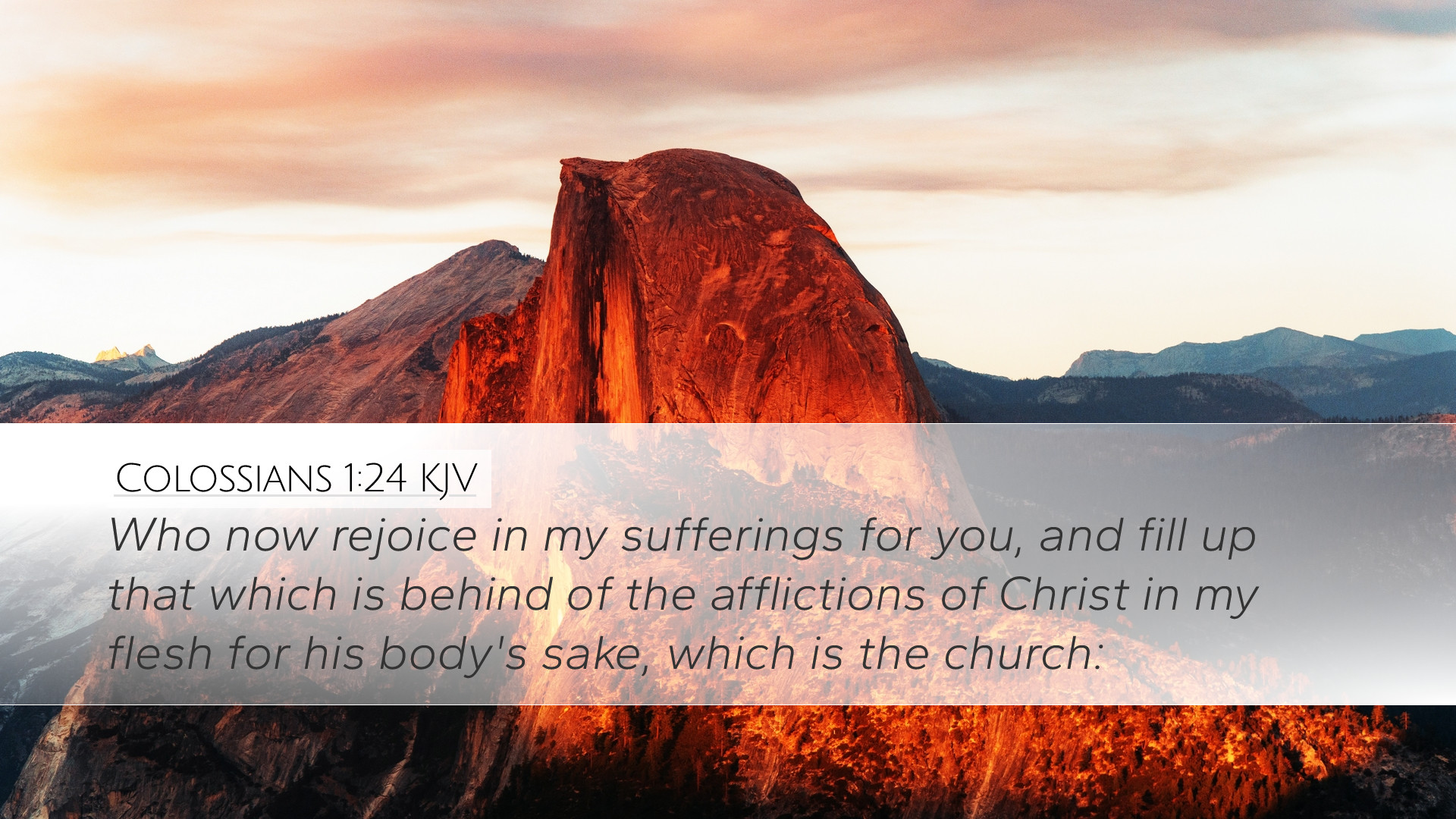Colossians 1:24 - Commentary
Verse: "Now I rejoice in my sufferings for your sake, and in my flesh I am filling up what is lacking in Christ's afflictions for the sake of his body, that is, the church."
Contextual Overview
The Apostle Paul writes to the Colossians to address heretical teachings and to affirm the supremacy of Christ. In this verse, he reflects on his own sufferings, revealing a profound spiritual insight into the nature of suffering and its significance for the body of Christ, the church.
Commentary Insights
1. Rejoicing in Suffering
Matthew Henry emphasizes the paradox of rejoicing in suffering. He notes that Paul finds joy not only in his own afflictions but in the benefits those sufferings bring to the church. This ties back to the Christian principle that suffering can lead to greater spiritual maturity and community strength.
Albert Barnes adds that Paul’s joy is rooted in the understanding that his suffering contributes to the expansion of the gospel and the care for the church's well-being. This illustrates a selfless love for fellow believers, reflecting Christ’s love.
2. Filling Up What is Lacking
Paul's statement about "filling up what is lacking in Christ's afflictions" is rich with theological implication. Adam Clarke interprets this not as a deficiency in Christ’s suffering but rather as an acknowledgment that Christ’s redemptive work is ongoing through the church. Paul sees his own sufferings as part of this divine narrative.
This can lead to the understanding that while Christ’s atoning work is complete, the sufferings of His followers serve to further demonstrate and communicate His love and sacrifice to the world.
3. The Church as the Body of Christ
This verse demonstrates an essential Christian doctrine: that the church is the body of Christ. Matthew Henry emphasizes that Christians are collectively responsible for each other’s spiritual growth and well-being. In this light, Paul’s suffering exemplifies his identification with the struggles faced by the church.
Albert Barnes further elaborates, stating that the struggles of one member of the body affect the whole. Paul's afflictions, therefore, can be seen not only as suffering but also as a source of encouragement and strength for the entire body of Christ.
4. The Challenge of Suffering
Suffering challenges many believers in their faith. Adam Clarke points out that the attitudes with which Christians approach their sufferings can significantly impact their spiritual journey. Instead of seeing it as a negative experience, Paul embodies a transformational perspective, viewing pain as a privilege and a part of his mission.
Matthew Henry notes that this attitude is counter to worldly views and calls Christians to adopt a mindset that glorifies God through trials, reflecting on James 1:2-4 where suffering is counted as joy for the growth it fosters.
Theological Reflections
- The Presence of Christ in Suffering: The acknowledgment that Christ’s afflictions continue through the trials of His followers demonstrates the union believers have with Him.
- The Redemptive Value of Suffering: Understanding that sufferings can have redemptive value underlines the theological underpinning that God can use all circumstances for His glory.
- The Collective Identity: This verse strengthens the idea of collective identity within the church, emphasizing that individual sufferings are connected to communal well-being.
Practical Applications
For pastors and ministry leaders, this verse serves as a profound reminder to encourage congregants in their personal trials, showing them that their struggles can be a source of strength for others.
For students and theologians, this verse invites deeper exploration into the nature of Christ’s suffering and its implications for soteriology and ecclesiology.
Conclusion
Colossians 1:24 encapsulates a striking blend of suffering and joy, individuality and community, highlighting the central role of Christ in the lives of believers. Paul’s insight serves as encouragement that through suffering, purpose is fulfilled and the church advances toward its mission in the world.


